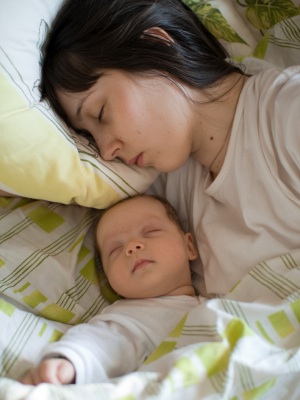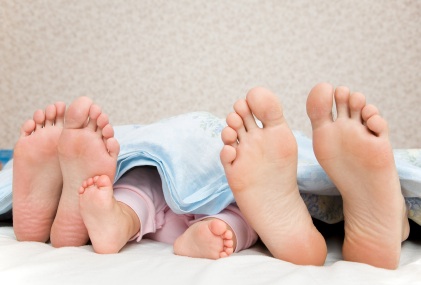During the eighteenth and nineteenth century the patriarchal medical profession began to supervise and control infant feeding and sleeping practise. What had previously been a skill handed down through generations became a set of guidelines and instructions that have done, and unfortunately continue to do, considerable damage to both mothers’ and babies health and well-being.
Bed sharing
Although there is a slowly growing return to natural parenting styles, bed sharing still seems to remain a bit of a taboo. Few parents happily admit to regularly bed sharing and night feeding, often feeling guilty or worried that they will somehow be perceived as weak or of somehow ‘spoiling’ their baby. The reality is that co-sleeping is actually far more common than we realise. A recent study by the FSID Research Department at Bristol University found that across the UK, on any one night, around 30% of one month old babies will be sharing a bed with their parents. And this figure remains significant even for babies up to a year old: 21% of 3-12 month olds will be sleeping with their parents on any given night.
“A combination of breastfeeding and bed sharing is the perfect way to mimic the conditions your baby has been used to during pregnancy”
Comforting closeness
Your baby has spent nine months inside your body with a constant supply of food and comfort. How strange and unnatural must it seem to be suddenly separated from you and expected to sleep, on his own, for long periods without food or comfort? A combination of breastfeeding and bed sharing is the perfect way to mimic, as far as possible, the conditions your baby has been used to for the nine months leading up to his birth. Sharing sleep helps baby to regulate sleep patterns and having a familiar person always nearby lessens anxiety at vulnerable stages of sleep, easing the transitions between deep and active sleep. Of course there are some circumstances when bed sharing is not appropriate but as long as you take some common sense precautions, it is a great way for new parents to get more sleep, bond with their baby, stimulate breastfeeding and probably help to protect against Sudden Infant Death Syndrome (SIDS) too.
Breastfeeding benefits
The relationship between bed sharing and breastfeeding appears to be very strong, although there is some dispute over the nature of the correlation. A study in South East England for instance showed bed sharing in hospital prior to discharge was associated with higher rates of exclusive breastfeeding at discharge. It also found bed sharing to be associated with a longer duration of breastfeeding. It did add however that ‘this may not necessarily be a causal relationship because breastfeeding may promote bed sharing’. Whatever the explanation, breastfeeding and co-sleeping naturally go hand in hand, offering both emotional and physical benefits to the whole family.

Get More Sleep
It’s official! Sleep is obviously a big concern for new parents and many mums are sceptical about the amount of sleep they will get if they share a bed with their baby AND provide instant access to their breasts throughout the night! Recent studies have shown however that breastfeeding mothers actually get more sleep than bottle feeding mothers, so long as they co-sleep. If mother and baby breastfeed but do not bed share, they will get less sleep. For bottle feeding mums, sleeping arrangements seem to have no effect on the amount of sleep mum gets.
Easier nighttimes
When you think about the practicalities of night feeding, this of course makes sense. A bottle feeding mother has to get out of bed and fetch a bottle regardless of where her baby is sleeping. A breastfeeding mother sharing a bed with her baby however, often doesn’t even have to wake up to feed her baby. How much easier can you get? Regular co-sleepers will also benefit from synchronised sleep cycles. This means that when your baby stirs, you are also likely be in a light sleep and it will feel much easier and more natural for you to wake up briefly, settle your baby and drift back to sleep together. Non bed sharers are more likely to find themselves roused from a deep sleep, feeling disorientated and disrupted. Not only this, it will probably take longer to settle the baby back to sleep as they have fully wakened in the time it has taken for the parent to wake up. Once this synchronisation of sleep has been established, most mothers report feeling more rested as they have not had their sleep patterns interrupted.
Protection against Sudden Infant Death Syndrome (SIDS)
Although nobody knows for sure what causes SIDS, we do know that the baby dies during sleep. A baby who falls victim to SIDS may have had difficulty regulating his breathing during sleep or arousing himself from sleep in the event of a breathing problem. Many studies have shown that SIDS is often linked to infrequent night wakings and less active sleep (REM sleep); the type that helps to stimulate breathing and heart rate. The combination of bed sharing and night feeding helps in numerous ways to reduce the risk of SIDS. For example, breastfeeding co-sleepers suck more. Sucking is associated with REM sleep, which in turn stimulates heart beat and breathing. Mothers too have more REM sleep when they sleep with their babies and so mother and baby’s sensitivity to each other is increased. Increased prolactin levels also increase mother’s responsiveness to her baby. These are by no means the only examples, but do help give an impression of the increased mother-baby awareness and sensitivity that arises when you combine breastfeeding and co-sleeping.
“Co-sleeping also increases the amount of skin-to-skin contact and touching that the baby receives from its’ parents.”
Boost your milk supply
Night feeding helps to maintain a healthy milk supply in two ways. Firstly, prolactin, the hormone responsible for milk production, is more responsive during sleep. Night feeding therefore gives an extra boost to prolactin levels and to your milk supply. Secondly, it is important to remember that milk carries on being produced day and night, and if this milk is not being removed at the same rate as it is formed, not only will a mother begin to suffer with engorgement, but she will also find that lactation is suppressed. Milk production works on a basic principle of supply and demand. If your body thinks no one wants the milk it’s so bountifully producing all night long, it will stop producing it.
Treat engorgement
Engorgement in itself is a serious problem. Not only is it very uncomfortable for the mother, it makes latching on difficult for the baby and can lead to other problems such as blocked ducts and mastitis if not dealt with properly. The best way to deal with engorgement is to feed frequently and not go for any long periods without breastfeeding. Night nursing is a great way to combat engorgement. Most mothers who share a bed with their baby and breastfeed them during the night do not suffer from engorgement at all.
Skin to skin contact
Co-sleeping also increases the amount of skin-to-skin contact and touching that the baby receives from its’ parents. Not only has this kind of tactile stimulation been shown to be stimulate breastfeeding specifically, it is also arguably “…beneficial to the entire baby, physically, emotionally and intellectually.” (Sears). The regulatory effects on baby’s breathing and heart beat which skin-to-skin contact promotes are particularly important in helping to protect against cot death.
Contraception
Breastfeeding has had a bit of a bad press in recent years as far as contraception goes. Well publicised incidences of celebrities becoming pregnant in the months following birth have done little to promote breastfeeding as a reliable method of contraception. In fact most studies show breastfeeding as a contraceptive to be about 98% effective so long as natural breastfeeding patterns are not interfered with. Breastfeeding will not be effective at suppressing fertility if your baby is going for long periods of time without feeding or if you are supplementing your baby’s diet with anything other than breastmilk. This could include the use of dummies, comforters, even thumbs, as well as formula milks, juices or plain water. Anything which alters the sucking patterns of a baby and distracts from breastfeeding will interfere with breastfeeding’s natural contraceptive effects. Sharing sleep and allowing your baby to suckle frequently throughout the night is an important part of suppressing ovulation as it ensures that you maintain the required frequency of feeds and does away with the need for artificial comforters.
Encouraging trust
Breastfeeding and bed sharing is so much more than just a decision about where your baby sleeps or how he is fed. William Sears captures the essence totally when he says “…it reflects an attitude of acceptance of your child as a little person with big needs. Your infant trusts that you, his parents, will be continually available during the night just as you are during the day…you trust your intuition about the parenting needs of your individual child rather than unquestioningly accepting the norms of society.”
TIPS FOR SAFE BED-SHARING
- Use a firm, flat mattress
- Dress your baby as you would dress yourself in bed – they don’t need to be overdressed – not only can this lead to overheating, it also means you lose out on all the benefits of skin-to-skin contact
- Keep baby’s head uncovered. Putting your baby in a hat at night will impair his ability to regulate his body temperature.
- Use a bed guard or move your bed up against a wall so your baby cannot fall out. Make sure there are no gaps or crevices between the bed and the rail/wall that your baby could fall into or get jammed in.
- Dads are normally less aware of the baby when they are asleep so you might feel happier with your baby between you and the wall/rail.







